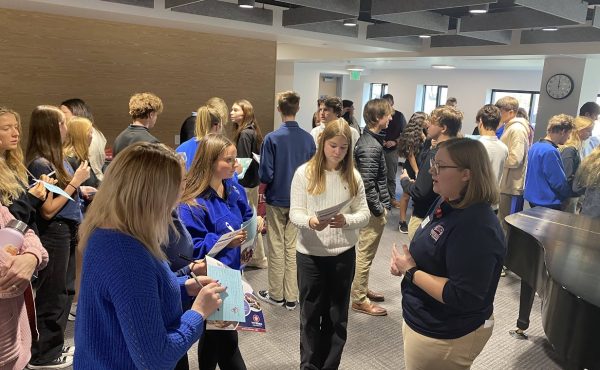Students need more sleep

Whether it’s coming home late from a sporting event, jazz band concerts, part time jobs, or that history test quiz the next morning, high school students are continuously losing sleep.
Due to the size of the school and level of student involvement, Cotter students in particular tend to have very busy schedules, making it difficult to get the amount of sleep a teenager needs. Sleep, along with good nutrition, exercise, and limiting screen time, are a teenagers way to staying healthy and dealing with the stress that comes with being an adolescent.
Students are suggested, by Sleep Foundation, to get 8-10 hours of sleep each night. However, when surveyed by Sleep Foundation only 15% of teens sleep 8.5 hours. When a group of 10 random Cotter students were surveyed, it resulted in an average of 6.7 hours of sleep; more than two hours less than the suggested minimum.
The lack of sleep may be a side effect of too much work, over-involvement, screen usage before sleep, and the unawareness of sleeping disorders. 31% of children report having sleep disorders, putting a major effect on their health and sleeping patterns as found by the Cologne Children’s Sleep study. When teens experience a poor and inconsistent sleep schedule, like staying up late and waking up late on weekends, it affects every other day of the week.
When students do not receive the appropriate rest time, there are many consequences that affect them for the next day, week, and their health throughout all stages of life. Some common effects of sleep deprivation are, low testosterone levels, weak balance, high blood pressure, and increased risk of diabetes and heart disease. Others include, memory loss, mood swings, weight gain, poor concentration, and higher risk of accidents. A week of poor sleep alone can drop testosterone levels of young men by 15% or more, found by a recent study by Men’s Health experts. This percentage is the same as men aging 10-15 years.
Additionally, the loss of sleep can affect the blood pressure. People who sleep under five hours each night, are at extreme risk for high blood pressure. High blood pressure can result in possible strokes, dizziness, chest pain, and risk of heart attacks.
However, for high schoolers effects such as poor focus, bad nutrition, moods, and frequent car accidents are more applicable. Sleep disrupts hormones in a teenagers body including serotonin, dopamine, and cortisol that have a strong effect on an adolescents concentration and emotion.
Sleep and moods go hand in hand; an effect of little sleep is crankiness, tiredness, anger, and irritation that can soon lead to bigger mood disorders such as anxiety. A symptom of anxiety and depression is sleeplessness. A lack of sleep doesn’t only affect your mood hormones, but Leptin, Ghrelin, and the amount of glucose in your body disturbing your appetite and overall altering your weight.
Lack of sleep also increases a desire for unhealthy foods, affecting weight gain. The scariest affect, in teens who recently received their driver’s license, is the higher risk in drowsy sleeping. A study in 2014 by the RAND Blog calculated that 1 in 10 car crashes are due to drowsy driving, and young drivers, people between the ages of 16–24, account for more than 50 percent of them.
All these negative consequences are not worth the extra half hour of studying, extra Netflix episode, or late Saturday nights and sleepy Sunday mornings. There are solutions to shifting a negative sleep cycle, little tips found through studies could benefit many Cotter students through increased sleep.
One of the hardest but most beneficial tips for better rest in teenagers, is limiting screen time specifically before falling asleep. It is advised that humans have 30 minutes of screen free time before bed, including tvs, computers, and phones. It seems easy when first heard, but for many teens checking screens is a powerful habit.
I can say from experience that after a long day of classes, sports practice, hours of homework, and who else knows what, it’s relaxing to lay in bed and wind down with Instagram or Netflix; what I don’t realize is that the extra sleep will help me stay relaxed longer. Being on a screen before bedtime stimulates your brain and confuses it with the daytime. Along with mixed signals, the blue light from all LED screens disrupts the sleep hormone stated before, melatonin; this does not only give an effect for one night, but the shift of naturally produced chemicals can affect your sleep for the future ahead.
Staying on your screen before rest will delay the time of deep sleep, ultimately getting less sleep and poor rest quality.
Secondly, it is important for teenagers, and everyone, to get in a consistent sleep routine. Your body becomes used to the time you are falling asleep and will naturally get tired when it is approaching the typical bedtime. This is why it is important to have the same bedtime each night, and wake up around the same time. In the same manner, this isn’t just effective during the weekdays, but should also stay in effect on the weekends. When a teenager stays up late on the weekends and sleeps in longer, it immediately changes the body’s idea of when you go to bed.
A simple step is to set alarms when you should get off your phone, get in bed, fall asleep, and wake up. Having the same bedtime and bedtime routine can properly set teenagers up for nights of rest of positive for weeks to come. Additionally, eliminating caffeine can help teens sleep longer and improved sleep. For many though, a good latte or frappuccino during the first period cures the morning drowsiness, but can later negatively affect your sleep cycle and you can become dependent on caffeine rather than a night’s rest. Many snacks and drinks teens intake have caffeine hidden within them, instead nutritionists suggest drinking a cup of evening tea. These are simple tips then can have a large positive shift on a teenagers sleep cycle and quality.
Cotter students are always on the go, striving for more, and losing the sleep suggested. It is important to fuel our bodies with the right amount of rest, exercise, and food to set us up for even more success at school and in out activities. When we put our health first and take proper steps into receiving appropriate rest, improvements in other areas like concentration, energy, grades, motivation, and overall mental health become visible.











